- Home
- Suzanne Collins
The Hunger Games Trilogy Page 4
The Hunger Games Trilogy Read online
Page 4
“Yes, there’s usually some,” I say.
“Katniss, it’s just hunting. You’re the best hunter I know,” says Gale.
“It’s not just hunting. They’re armed. They think,” I say.
“So do you. And you’ve had more practice. Real practice,” he says. “You know how to kill.”
“Not people,” I say.
“How different can it be, really?” says Gale grimly.
The awful thing is that if I can forget they’re people, it will be no different at all.
The Peacekeepers are back too soon and Gale asks for more time, but they’re taking him away and I start to panic. “Don’t let them starve!” I cry out, clinging to his hand.
“I won’t! You know I won’t! Katniss, remember I—” he says, and they yank us apart and slam the door and I’ll never know what it was he wanted me to remember.
It’s a short ride from the Justice Building to the train station. I’ve never been in a car before. Rarely even ridden in wagons. In the Seam, we travel on foot.
I’ve been right not to cry. The station is swarming with reporters with their insectlike cameras trained directly on my face. But I’ve had a lot of practice at wiping my face clean of emotions and I do this now. I catch a glimpse of myself on the television screen on the wall that’s airing my arrival live and feel gratified that I appear almost bored.
Peeta Mellark, on the other hand, has obviously been crying and interestingly enough does not seem to be trying to cover it up. I immediately wonder if this will be his strategy in the Games. To appear weak and frightened, to reassure the other tributes that he is no competition at all, and then come out fighting. This worked very well for a girl, Johanna Mason, from District 7 a few years back. She seemed like such a sniveling, cowardly fool that no one bothered about her until there were only a handful of contestants left. It turned out she could kill viciously. Pretty clever, the way she played it. But this seems an odd strategy for Peeta Mellark because he’s a baker’s son. All those years of having enough to eat and hauling bread trays around have made him broad-shouldered and strong. It will take an awful lot of weeping to convince anyone to overlook him.
We have to stand for a few minutes in the doorway of the train while the cameras gobble up our images, then we’re allowed inside and the doors close mercifully behind us. The train begins to move at once.
The speed initially takes my breath away. Of course, I’ve never been on a train, as travel between the districts is forbidden except for officially sanctioned duties. For us, that’s mainly transporting coal. But this is no ordinary coal train. It’s one of the high-speed Capitol models that average 250 miles per hour. Our journey to the Capitol will take less than a day.
In school, they tell us the Capitol was built in a place once called the Rockies. District 12 was in a region known as Appalachia. Even hundreds of years ago, they mined coal here. Which is why our miners have to dig so deep.
Somehow it all comes back to coal at school. Besides basic reading and math most of our instruction is coal-related. Except for the weekly lecture on the history of Panem. It’s mostly a lot of blather about what we owe the Capitol. I know there must be more than they’re telling us, an actual account of what happened during the rebellion. But I don’t spend much time thinking about it. Whatever the truth is, I don’t see how it will help me get food on the table.
The tribute train is fancier than even the room in the Justice Building. We are each given our own chambers that have a bedroom, a dressing area, and a private bathroom with hot and cold running water. We don’t have hot water at home, unless we boil it.
There are drawers filled with fine clothes, and Effie Trinket tells me to do anything I want, wear anything I want, everything is at my disposal. Just be ready for supper in an hour. I peel off my mother’s blue dress and take a hot shower. I’ve never had a shower before. It’s like being in a summer rain, only warmer. I dress in a dark green shirt and pants.
At the last minute, I remember Madge’s little gold pin. For the first time, I get a good look at it. It’s as if someone fashioned a small golden bird and then attached a ring around it. The bird is connected to the ring only by its wing tips. I suddenly recognize it. A mockingjay.
They’re funny birds and something of a slap in the face to the Capitol. During the rebellion, the Capitol bred a series of genetically altered animals as weapons. The common term for them was muttations, or sometimes mutts for short. One was a special bird called a jabberjay that had the ability to memorize and repeat whole human conversations. They were homing birds, exclusively male, that were released into regions where the Capitol’s enemies were known to be hiding. After the birds gathered words, they’d fly back to centers to be recorded. It took people awhile to realize what was going on in the districts, how private conversations were being transmitted. Then, of course, the rebels fed the Capitol endless lies, and the joke was on it. So the centers were shut down and the birds were abandoned to die off in the wild.
Only they didn’t die off. Instead, the jabberjays mated with female mockingbirds, creating a whole new species that could replicate both bird whistles and human melodies. They had lost the ability to enunciate words but could still mimic a range of human vocal sounds, from a child’s high-pitched warble to a man’s deep tones. And they could re-create songs. Not just a few notes, but whole songs with multiple verses, if you had the patience to sing them and if they liked your voice.
My father was particularly fond of mockingjays. When we went hunting, he would whistle or sing complicated songs to them and, after a polite pause, they’d always sing back. Not everyone is treated with such respect. But whenever my father sang, all the birds in the area would fall silent and listen. His voice was that beautiful, high and clear and so filled with life it made you want to laugh and cry at the same time. I could never bring myself to continue the practice after he was gone. Still, there’s something comforting about the little bird. It’s like having a piece of my father with me, protecting me. I fasten the pin onto my shirt, and with the dark green fabric as a background, I can almost imagine the mockingjay flying through the trees.
Effie Trinket comes to collect me for supper. I follow her through the narrow, rocking corridor into a dining room with polished paneled walls. There’s a table where all the dishes are highly breakable. Peeta Mellark sits waiting for us, the chair next to him empty.
“Where’s Haymitch?” asks Effie Trinket brightly.
“Last time I saw him, he said he was going to take a nap,” says Peeta.
“Well, it’s been an exhausting day,” says Effie Trinket. I think she’s relieved by Haymitch’s absence, and who can blame her?
The supper comes in courses. A thick carrot soup, green salad, lamb chops and mashed potatoes, cheese and fruit, a chocolate cake. Throughout the meal, Effie Trinket keeps reminding us to save space because there’s more to come. But I’m stuffing myself because I’ve never had food like this, so good and so much, and because probably the best thing I can do between now and the Games is put on a few pounds.
“At least, you two have decent manners,” says Effie as we’re finishing the main course. “The pair last year ate everything with their hands like a couple of savages. It completely upset my digestion.”
The pair last year were two kids from the Seam who’d never, not one day of their lives, had enough to eat. And when they did have food, table manners were surely the last thing on their minds. Peeta’s a baker’s son. My mother taught Prim and me to eat properly, so yes, I can handle a fork and knife. But I hate Effie Trinket’s comment so much I make a point of eating the rest of my meal with my fingers. Then I wipe my hands on the tablecloth. This makes her purse her lips tightly together.
Now that the meal’s over, I’m fighting to keep the food down. I can see Peeta’s looking a little green, too. Neither of our stomachs is used to such rich fare. But if I can hold down Greasy Sae’s concoction of mice meat, pig entrails, and tree bark—a winter
specialty—I’m determined to hang on to this.
We go to another compartment to watch the recap of the reapings across Panem. They try to stagger them throughout the day so a person could conceivably watch the whole thing live, but only people in the Capitol could really do that, since none of them have to attend reapings themselves.
One by one, we see the other reapings, the names called, the volunteers stepping forward or, more often, not. We examine the faces of the kids who will be our competition. A few stand out in my mind. A monstrous boy who lunges forward to volunteer from District 2. A fox-faced girl with sleek red hair from District 5. A boy with a crippled foot from District 10. And most hauntingly, a twelve-year-old girl from District 11. She has dark brown skin and eyes, but other than that, she’s very like Prim in size and demeanor. Only when she mounts the stage and they ask for volunteers, all you can hear is the wind whistling through the decrepit buildings around her. There’s no one willing to take her place.
Last of all, they show District 12. Prim being called, me running forward to volunteer. You can’t miss the desperation in my voice as I shove Prim behind me, as if I’m afraid no one will hear and they’ll take Prim away. But, of course, they do hear. I see Gale pulling her off me and watch myself mount the stage. The commentators are not sure what to say about the crowd’s refusal to applaud. The silent salute. One says that District 12 has always been a bit backward but that local customs can be charming. As if on cue, Haymitch falls off the stage, and they groan comically. Peeta’s name is drawn, and he quietly takes his place. We shake hands. They cut to the anthem again, and the program ends.
Effie Trinket is disgruntled about the state her wig was in. “Your mentor has a lot to learn about presentation. A lot about televised behavior.”
Peeta unexpectedly laughs. “He was drunk,” says Peeta. “He’s drunk every year.”
“Every day,” I add. I can’t help smirking a little. Effie Trinket makes it sound like Haymitch just has somewhat rough manners that could be corrected with a few tips from her.
“Yes,” hisses Effie Trinket. “How odd you two find it amusing. You know your mentor is your lifeline to the world in these Games. The one who advises you, lines up your sponsors, and dictates the presentation of any gifts. Haymitch can well be the difference between your life and your death!”
Just then, Haymitch staggers into the compartment. “I miss supper?” he says in a slurred voice. Then he vomits all over the expensive carpet and falls in the mess.
“So laugh away!” says Effie Trinket. She hops in her pointy shoes around the pool of vomit and flees the room.
4
For a few moments, Peeta and I take in the scene of our mentor trying to rise out of the slippery vile stuff from his stomach. The reek of vomit and raw spirits almost brings my dinner up. We exchange a glance. Obviously Haymitch isn’t much, but Effie Trinket is right about one thing, once we’re in the arena he’s all we’ve got. As if by some unspoken agreement, Peeta and I each take one of Haymitch’s arms and help him to his feet.
“I tripped?” Haymitch asks. “Smells bad.” He wipes his hand on his nose, smearing his face with vomit.
“Let’s get you back to your room,” says Peeta. “Clean you up a bit.”
We half-lead half-carry Haymitch back to his compartment. Since we can’t exactly set him down on the embroidered bedspread, we haul him into the bathtub and turn the shower on him. He hardly notices.
“It’s okay,” Peeta says to me. “I’ll take it from here.”
I can’t help feeling a little grateful since the last thing I want to do is strip down Haymitch, wash the vomit out of his chest hair, and tuck him into bed. Possibly Peeta is trying to make a good impression on him, to be his favorite once the Games begin. But judging by the state he’s in, Haymitch will have no memory of this tomorrow.
“All right,” I say. “I can send one of the Capitol people to help you.” There’s any number on the train. Cooking for us. Waiting on us. Guarding us. Taking care of us is their job.
“No. I don’t want them,” says Peeta.
I nod and head to my own room. I understand how Peeta feels. I can’t stand the sight of the Capitol people myself. But making them deal with Haymitch might be a small form of revenge. So I’m pondering the reason why he insists on taking care of Haymitch and all of a sudden I think, It’s because he’s being kind. Just as he was kind to give me the bread.
The idea pulls me up short. A kind Peeta Mellark is far more dangerous to me than an unkind one. Kind people have a way of working their way inside me and rooting there. And I can’t let Peeta do this. Not where we’re going. So I decide, from this moment on, to have as little as possible to do with the baker’s son.
When I get back to my room, the train is pausing at a platform to refuel. I quickly open the window, toss the cookies Peeta’s father gave me out of the train, and slam the glass shut. No more. No more of either of them.
Unfortunately, the packet of cookies hits the ground and bursts open in a patch of dandelions by the track. I only see the image for a moment, because the train is off again, but it’s enough. Enough to remind me of that other dandelion in the school yard years ago…
I had just turned away from Peeta Mellark’s bruised face when I saw the dandelion and I knew hope wasn’t lost. I plucked it carefully and hurried home. I grabbed a bucket and Prim’s hand and headed to the Meadow and yes, it was dotted with the golden-headed weeds. After we’d harvested those, we scrounged along inside the fence for probably a mile until we’d filled the bucket with the dandelion greens, stems, and flowers. That night, we gorged ourselves on dandelion salad and the rest of the bakery bread.
“What else?” Prim asked me. “What other food can we find?”
“All kinds of things,” I promised her. “I just have to remember them.”
My mother had a book she’d brought with her from the apothecary shop. The pages were made of old parchment and covered in ink drawings of plants. Neat handwritten blocks told their names, where to gather them, when they came in bloom, their medical uses. But my father added other entries to the book. Plants for eating, not healing. Dandelions, pokeweed, wild onions, pines. Prim and I spent the rest of the night poring over those pages.
The next day, we were off school. For a while I hung around the edges of the Meadow, but finally I worked up the courage to go under the fence. It was the first time I’d been there alone, without my father’s weapons to protect me. But I retrieved the small bow and arrows he’d made me from a hollow tree. I probably didn’t go more than twenty yards into the woods that day. Most of the time, I perched up in the branches of an old oak, hoping for game to come by. After several hours, I had the good luck to kill a rabbit. I’d shot a few rabbits before, with my father’s guidance. But this I’d done on my own.
We hadn’t had meat in months. The sight of the rabbit seemed to stir something in my mother. She roused herself, skinned the carcass, and made a stew with the meat and some more greens Prim had gathered. Then she acted confused and went back to bed, but when the stew was done, we made her eat a bowl.
The woods became our savior, and each day I went a bit farther into its arms. It was slow-going at first, but I was determined to feed us. I stole eggs from nests, caught fish in nets, sometimes managed to shoot a squirrel or rabbit for stew, and gathered the various plants that sprung up beneath my feet. Plants are tricky. Many are edible, but one false mouthful and you’re dead. I checked and double-checked the plants I harvested with my father’s pictures. I kept us alive.
Any sign of danger, a distant howl, the inexplicable break of a branch, sent me flying back to the fence at first. Then I began to risk climbing trees to escape the wild dogs that quickly got bored and moved on. Bears and cats lived deeper in, perhaps disliking the sooty reek of our district.
On May 8th, I went to the Justice Building, signed up for my tesserae, and pulled home my first batch of grain and oil in Prim’s toy wagon. On the eighth of every
month, I was entitled to do the same. I couldn’t stop hunting and gathering, of course. The grain was not enough to live on, and there were other things to buy, soap and milk and thread. What we didn’t absolutely have to eat, I began to trade at the Hob. It was frightening to enter that place without my father at my side, but people had respected him, and they accepted me. Game was game after all, no matter who’d shot it. I also sold at the back doors of the wealthier clients in town, trying to remember what my father had told me and learning a few new tricks as well. The butcher would buy my rabbits but not squirrels. The baker enjoyed squirrel but would only trade for one if his wife wasn’t around. The Head Peacekeeper loved wild turkey. The mayor had a passion for strawberries.
In late summer, I was washing up in a pond when I noticed the plants growing around me. Tall with leaves like arrowheads. Blossoms with three white petals. I knelt down in the water, my fingers digging into the soft mud, and I pulled up handfuls of the roots. Small, bluish tubers that don’t look like much but boiled or baked are as good as any potato. “Katniss,” I said aloud. It’s the plant I was named for. And I heard my father’s voice joking, “As long as you can find yourself, you’ll never starve.” I spent hours stirring up the pond bed with my toes and a stick, gathering the tubers that floated to the top. That night, we feasted on fish and katniss roots until we were all, for the first time in months, full.
Slowly, my mother returned to us. She began to clean and cook and preserve some of the food I brought in for winter. People traded us or paid money for her medical remedies. One day, I heard her singing.
Prim was thrilled to have her back, but I kept watching, waiting for her to disappear on us again. I didn’t trust her. And some small gnarled place inside me hated her for her weakness, for her neglect, for the months she had put us through. Prim forgave her, but I had taken a step back from my mother, put up a wall to protect myself from needing her, and nothing was ever the same between us again.

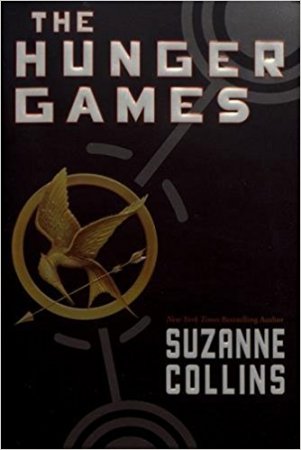 The Hunger Games
The Hunger Games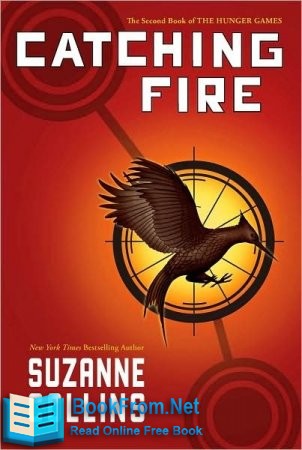 Catching Fire
Catching Fire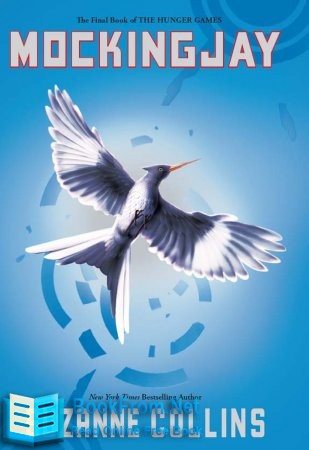 Mockingjay
Mockingjay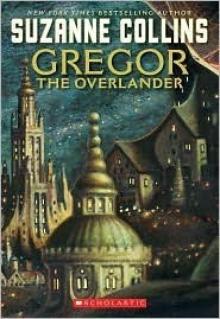 Gregor the Overlander
Gregor the Overlander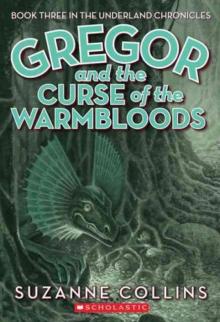 Gregor and the Curse of the Warmbloods
Gregor and the Curse of the Warmbloods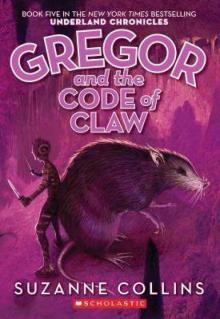 Gregor and the Code of Claw
Gregor and the Code of Claw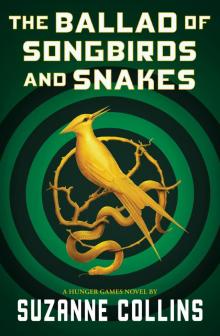 The Ballad of Songbirds and Snakes
The Ballad of Songbirds and Snakes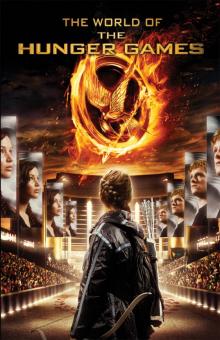 The World of the Hunger Games
The World of the Hunger Games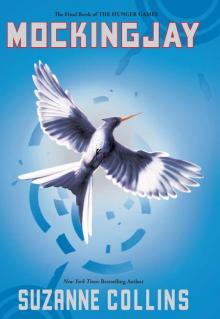 Mockingjay (The Final Book of The Hunger Games)
Mockingjay (The Final Book of The Hunger Games)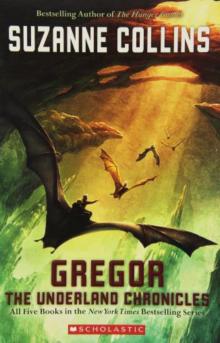 The Underland Chronicles: Books 1-5 Paperback Box Set
The Underland Chronicles: Books 1-5 Paperback Box Set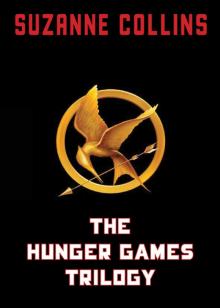 The Hunger Games Trilogy
The Hunger Games Trilogy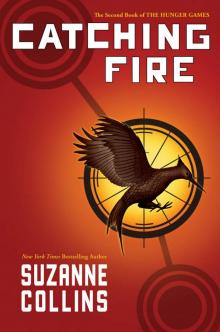 Hunger Games 02 - Catching Fire
Hunger Games 02 - Catching Fire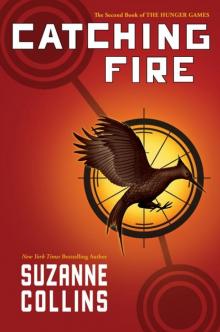 Cathing Fire thg-2
Cathing Fire thg-2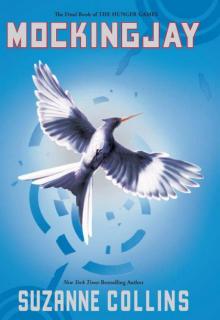 Hunger Games 03-Mockingjay
Hunger Games 03-Mockingjay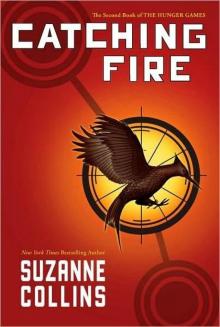 Hunger Games 2 - Catching Fire
Hunger Games 2 - Catching Fire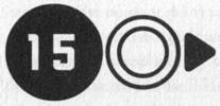 Hunger Games 01 - The Hunger Games
Hunger Games 01 - The Hunger Games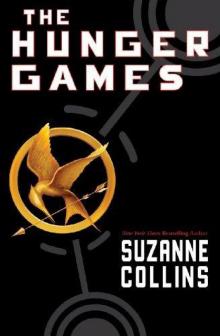 Hunger Games 01-The Hunger Games
Hunger Games 01-The Hunger Games